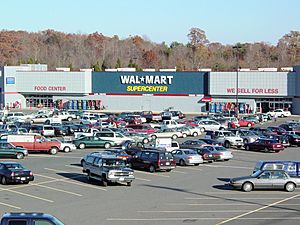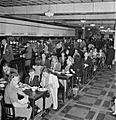Chain store facts for kids

Chain stores are groups of retail stores that share the same brand name and are managed from a central office. Imagine a big company that owns many shops, all looking similar and selling similar things. These shops are chain stores. They often use the same business methods and practices everywhere. This helps them offer a consistent experience to customers, no matter which store they visit.
Some chain stores are owned by the same company. Others are franchised, meaning different people own individual stores but still follow the rules of the main brand. Many popular restaurants are also chains, like fast-food places you might know.
Contents
What Are Chain Stores?
Chain stores are businesses that have multiple locations operating under the same name. They usually have a main office that makes decisions for all the stores. This includes things like what products to sell, how to decorate the stores, and how to train employees.
Why Do We Have Chain Stores?
Chain stores are very common because they offer several benefits. For customers, they provide a familiar experience. You know what to expect when you walk into a store from a chain you recognize. For businesses, it's often easier to manage many stores when they all follow the same plan. They can buy products in large amounts, which can save money. They can also advertise for all their stores at once.
Examples of Chain Stores
You probably see chain stores every day!
- Supermarkets: Large grocery stores like Walmart or Target often have many locations.
- Restaurants: Fast-food chains like McDonald's or Subway are great examples.
- Clothing stores: Many popular clothing brands have stores in malls and shopping centers all over the world.
- Coffee shops: Places like Starbucks are famous chain coffee shops.
How Chain Stores Work
Chain stores operate by having a central management team. This team sets the rules and strategies for all the individual stores.
Standardized Operations
One key feature of chain stores is their standardized operations. This means that each store in the chain tries to offer the same products and services. They also use similar layouts and designs. This consistency helps customers feel comfortable and know what to expect. It also makes it easier for the company to train staff and manage inventory.
Franchising Explained
Some chain stores grow through a system called franchising. In a franchise, a person or group buys the right to open a store using an existing brand's name and business model. The main company provides support, training, and marketing. In return, the franchisee pays fees and follows the brand's rules. This allows the brand to expand quickly without owning every single store.
Benefits and Challenges
Chain stores offer many advantages, but they also face some challenges.
Advantages of Chain Stores
- Brand Recognition: People already know the brand, which helps attract customers.
- Cost Savings: Buying products in bulk for many stores can lead to lower prices.
- Marketing Power: They can afford big advertising campaigns that reach many people.
- Consistency: Customers know what to expect, which builds trust.
Challenges for Chain Stores
- Less Flexibility: Individual stores might not be able to adapt quickly to local tastes.
- Competition: They face strong competition from other chains and local businesses.
- Reputation Risk: A problem at one store can affect the reputation of the entire chain.
Related pages
- List of supermarkets, contains a number of chain stores
Images for kids
-
Opening the first of its chain of teashops in 1894, branch of Lyons in Reading, Berkshire pictured in 1945.
-
A Subway franchise restaurant.
See also
 In Spanish: Cadena comercial para niños
In Spanish: Cadena comercial para niños
 | Mary Eliza Mahoney |
 | Susie King Taylor |
 | Ida Gray |
 | Eliza Ann Grier |




